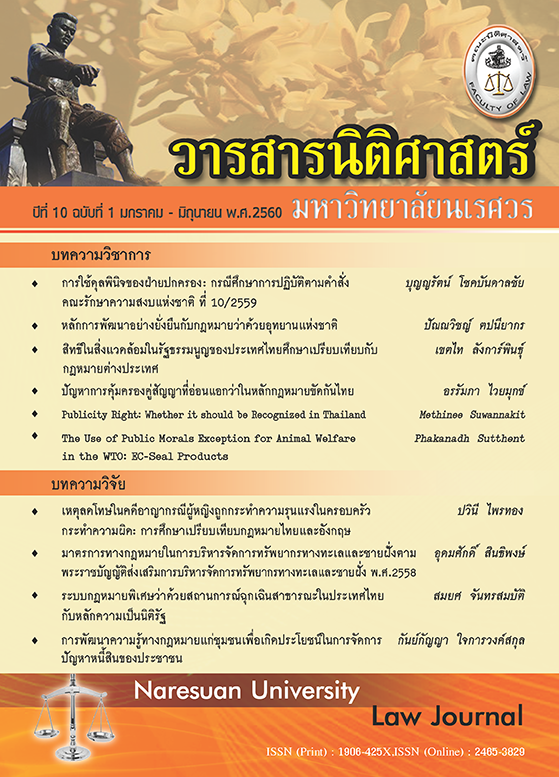The Exceptional Legal System of the Public Emergency Situation in Thailand under the Principles of Legal State
Main Article Content
Abstract
Under the rule of law in a liberal democratic society, the proclamation of a state of emergency and the subsequent exercise of emergency powers are accepted only when it is necessary to resolve the problems in times of crisis for the existence of the state. Every proclamation must be undertaken on the basis of democratic values as well as the rule of law, that is, to guarantee the exercise of the most fundamental human rights. Since the proclamation and the exercise of emergency power may constitute the violation of fundamental human rights and freedom, the international law instruments, such as International Covenant on Civil and Political Rights 1966, the European Convention on Human Rights 1950, the American Convention on Human Rights 1969, as well as the international minimum standards and principles which were put forwards by international bodies concerning the aforementioned Conventions ; e.g. The Paris Minimum Standards of Human Rights Norms in a State of Emergency, The Siracusa Principles on the Limitation and Derogation Provisions in the International Covenant on Civil and Political Rights 1984, have provided the regulations for a state party including Thailand to operate correctly, during the proclamation of the state of emergency. This research indicates the guidelines in enacting the law of a state of emergency in the United Kingdom, United States of America, French Republic, Federal Republic of Germany, Republic of South Africa and Thailand. It found that the legal system in Thailand does not comply with minimum standards of the international treaties, particularly control of the proclamation of a state of emergency and the implementation period. It is, therefore, recommended that there should be the legislative amendment to be in line with the international minimum standards
Article Details
References
Bruce, Ackerman. “The Emergency Constitution.” The Yale Law Journal 113 (2004): 1046.
Cabinet Office. “Civil Contingencies Act 2004: A Short Guide (Revised).” Last modified n.d. Accessed March 20, 2013. https://www.cambridge.gov.uk/sites/.../CCA-Short%20-Guide.pdf.
Conn, Laura. “The Enumeration of Vital Civil Liberties within a Constitution State of Emergency Clause: Lessons from the United States, the New Democracy of South Africa, and International Treaties and Scholarship.” University of Pennsylvania Journal of Constitutional Law 10, no. 4 (2008): 805.
DiFabbio, Benjamin Salvatore. The Rule That Proves the Exception: A Constitutional State of Emergency in the United State. New York: Annandale-on-Hudson, 2013.
Feldman, William. “Theories of the Emergency Powers: A Comparative Analysis of American Martial Law and the French State of Siege.” Cornell International Law Journal 38, no. 3 (2005): 1023-1032.
Hartman, John F “Derogation from Human Rights Treaties in Public Emergencies-A Critique of Implementation by the European Commission and Court of Human Rights Committee of the United Nations.” Harvard International Law Journal 22, no. 1 (1981): 27.
Humby, Tracy. Analysis of Legislation Related to Disaster Risk Reduction in South Africa. Geneva: International Federation of Red Cross and Red Cressent Societies, 2014.
Jakab, Andras. “German Constitution Law and Doctrine on State of Emergency-Paradigms and Dilemmas of a Traditional (Continental) Discourse.” German Law Journal 5 (2005): 457.
Khakee, Anna. “Securing Democracy? A Comparative Analysis of Emergency Powers in Europe (Geneva Centre for the Democratic Control of Armed Forces (Dcaf) Policy Paper - No.30).” Last modified 2009. Accessed November 19, 2010. https://www.thepolicypractice.com/cvs/AnnaKhakee.doc.
Lillich, Richard B. “The Paris Minimum Standards of Human Rights Norms in a State of Emergency.” The American Journal of International Law 79 (1985): 1072.
Nantawat Boramanand. “The Perspectives on Emergency Decree on Public Administration in State of Emergency, BE. 2548.” In The Collection of Editorials from Website www.pub-law.net (BE. 2544-2549), 420-426, Bangkok: P. Press, 2006. [In Thai]
Office of the High Commissioner for Human Rights in Cooperation with the International Bar Association. Human Rights in the Administration of Justice: A Manual on Human Rights for Judges, Prosecutors and Lawyers. New York and Geneva: United Nation, 2003.
Piyabutr Saengkanokku. The Proposal for Political Reform in France (3). Last modified 2008, Accessed April 20, 2010. https://www.onopen.com/2007/01/1756 [In Thai]
Roach, Kent. “Ordinary Laws for Emergencies and Democratic Derogations from Rights.” In Emergencies and the Limits of Legality, edited by Victor V. Ramraj, 235.
Cambridge: Cambridge University Press, 2008.
Rossiter, Clinton L. Constitutional Dictatorship: Crisis Government in Modern Democracies. Princeton: Princeton University Press, 1948.
Rule of Law in Armed Conflicts Project. “Derogation from Human Rights Treaties in Situations of Emergency.” Last modified n.d. Accessed November 3, 2012. https://www.genevaacademy.ch/RULAC/derogationfrom_
human_rights_treaties_in_situations_of_emergency.php.
The Guardian. “Civil Contingencies Act 2004: A Wide-Ranging Act Making Provisions for National Emergencies.” Last modified 2004. Accessed March 20, 2013. https://www.guardian.co.uk/commentisfree/libertycentral/2008/dec/16/civil-contingencies-act.
United Nations, Economic and Social Council, U.N. Sub-Commission on Prevention of Discrimination and Protection of Minorities,. “Siracusa Principles on the Limitation and Derogation of Provisions in the International Covenant on Civil and Political Rights, Annex, Un Doc E/Cn.4/1984/4 (1984).” Last modified 1984. Accessed January 15, 2009. https://hei.unige.ch/~clapham/hrdoc/docs/siracusa.html.
Walker, Clive, and Jame Broderlick. The Civil Contingencies Act 2004: Risk, Resilience and the Law in the United Kingdom. Oxford: Oxford University Press, 2006.
Welikala, Asanga. A State of Permanent Crisis: Constitutional Government, Fundamental Rights and State of Emergency in Sri Lanka. Colombo: Centre of Policy Alternatives, 2008.
Wilson, Richard A. The Politics of Truth and Reconciliation in South Africa: Legitimizing the Post-Apartheid State. New York: Cambridge University Press, 2001.
Worachet Pakeerat. The Doctrine of the State and the Administrative Law Principles. Bangkok: Project for the Promotion of Textbook and Teaching Materials. The Faculty of Law. Thammasat University, 2012. [In Thai]


